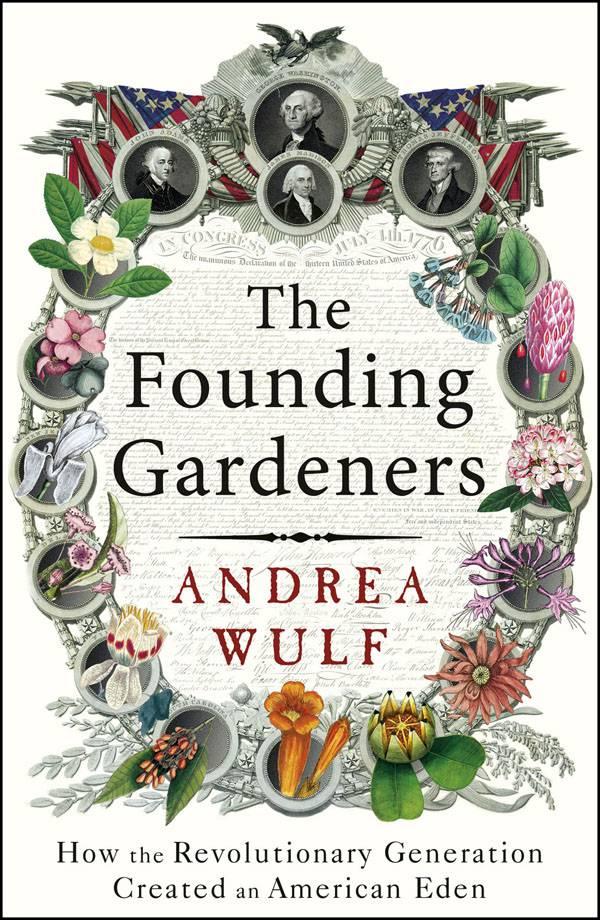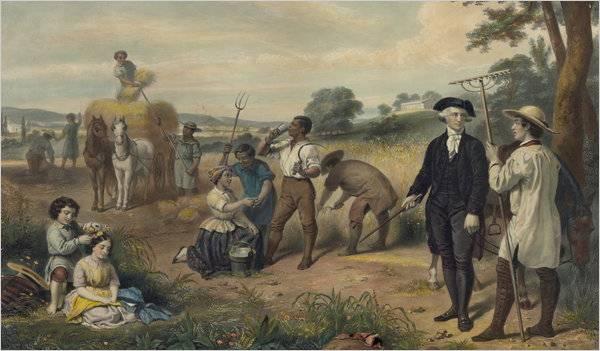By Andrea Wulf,

As America's gardeners dig, plant, weed and grow lettuce, beans and tomatoes in their vegetable plots this summer, they are part of a tradition that harks back to the beginnings of the United States. Just by working on a compost pile this weekend, you'll be in good historical company. The first four presidents of the United States — George Washington, John Adams, Thomas Jefferson and James Madison — were all utterly obsessed with manure and recipes for compost. Adams even jumped into a stinking pile when he was America's first "minister plenipotentiary" to Britain in London in 1786. Teasing apart the straw from the dung (clearly not minding the muck on his hands), he declared with glee that it was "not equal to mine."
Washington, Adams, Jefferson and Madison regarded themselves first as gardeners and farmers, not politicians. They wove their passion for gardens and nature into the fabric of America; it was aligned with their political thought. Agriculture would be the foundation of the new republic, they believed. "Cultivators of the earth," Jefferson wrote, "are the most vigorous, the most independent, the most virtuous." The greater the proportion of husbandmen, Madison believed, "the more free, the more independent and the more happy must be the society itself."
SUPPORTED BY HEROES LIKE YOU
Support independent eco journalism that drives real change.There is a pivotal moment at the beginning of the revolution that sums up their passion. In the summer of 1776, just after the colonists declared independence, New York faced 30,000 British troops, the largest enemy force that had ever arrived on America's shores. As he prepared for the first and largest battle of the Revolutionary War, Washington pondered not only his military strategy but also the voluptuous blossom of rhododendron, the sculptural flowers of mountain laurel and the perfect pink of crab apple.

George Washington directing field workers at Mount Vernon
One evening, just a few days before the battle, he wrote a long letter to the estate manager at Mount Vernon, his plantation in Virginia. Washington instructed that these trees and shrubs should be planted in groves next to his house. Even more remarkable than his timing was his choice of plants, for he made it clear that only native species would do. Facing the mighty British army, Washington decided that Mount Vernon was to be an American garden where no English trees would be allowed to claw their roots into the soil. It was his horticultural Declaration of Independence.
Into their speeches, their letters and their diaries, the founders brought metaphors drawn from the natural world. Jefferson described the blood of patriots as the "natural manure" for the tree of liberty, and Washington called the young nation after the war a "goodly field" that needed to be "judiciously cultivated." They used their gardens as canvases to paint (or to grow) political statements, and they saw in America's rugged wilderness a transcendent symbol of a unique New World nation. Jefferson commissioned a drawing of the Natural Bridge in Virginia, a spectacular granite formation on his land, so that he could present "to the world this singular landscape, which otherwise some bungling European will misrepresent."
Maybe most extraordinary — given the current miserable state of America's efforts to curb emissions and its failure to ratify international climate treaties — is that the birth of the environmental movement in this country can also be traced back to the Founding Fathers. In an 1818 speech, Madison said the protection of the environment was essential for the survival of the United States. He condemned Virginians for their ruthless exploitation of the soil and the destruction of the forests, and he talked about the "balance of nature." Man had to give back to nature what he took from it: "Vegetable matter which springs from the earth," he said, must "return to the earth" — radical views at a time when most still believed that God had created plants and animals entirely for the use of humankind.
Over the past months I have given almost 40 lectures across the U.S. about the Founding Fathers and how their attitude toward nature shaped the American nation. Over and over, audiences have been surprised — and delighted — to hear about Madison's speech. "Why has this been ignored for so long?" they want to know. Many of the gardeners that I have met over the past months are deeply invested in the environment. Working with the soil and plants, they feel connected to the land. It gives many an understanding and ownership of the world around them (and the threat to this environment). Most people today, however, don't regard gardening as an overtly political act, as it was for the Founding Fathers. But it can empower people and local communities. The rise of urban farming and gardening across the country in the past decade and the increasing interest in local produce is one example — it gives Americans control over their food and its production, which for the most part is in the hands of industry and huge conglomerates.
 George Washington at Bartram's Garden
In big cities like Los Angeles, if you grow vegetables on "edible" food-producing wall panels and on roofs, or subscribe to weekly boxes of fresh produce from local farms, or even plant drought-tolerant frontyards, you're making a political statement. Keeping a compost pile eliminates the need for chemical fertilizers; organic gardens that invite useful insects avoid the use of harmful pesticides; and local produce can reduce carbon emissions associated with industrial food production and long-distance transportation. Over the years, the founders have been invoked by almost every politician and every political movement across a wide spectrum. Now it's time for the gardeners and environmentalists, who are already following in the footsteps of the Founding Gardeners, to claim their stake in the ideals and the heroes that formed the nation.
Andrea Wulf's book "[Founding Gardeners — The Revolutionary Generation, Nature and the Shaping of the American Nation](http://www.andreawulf.com/founding-gardeners-the-revolutionary-generation-nature-and-the-shaping-of-the-american-nation.html)" is published by Knopf. Andrea also wrote The Brother Gardeners. Botany, Empire and the Birth of an Obsession and [This Other Eden](http://www.amazon.co.uk/This-Other-Eden-Gardens-English/dp/0316725803) Seven Great Gardens and Three Hundred Years of English History.__

Andrea Wulf



